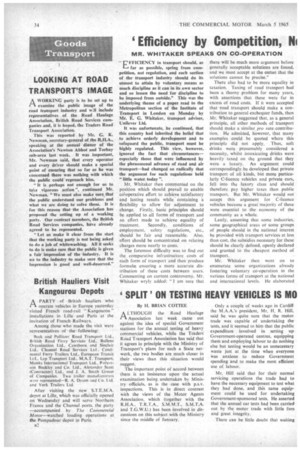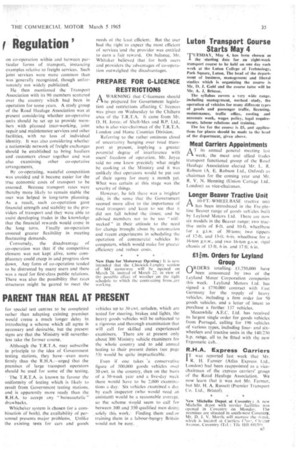' SPLIT' ON TESTING HEAVY VEHICLES IS MO
Page 36

Page 37

If you've noticed an error in this article please click here to report it so we can fix it.
PARENT THAN REAL AT PRESENT
• By H. BRIAN COTTER
A LTHOUGH the Road Haulage rik Association last week came out against the idea of special Government stations for the annual testing of heavy commercial vehicles, while the Traders Road Transport Association has said that it agrees in principle with the Ministry of Transport's plans for such a State network, the two bodies are much closer in their views than this situation would suggest.
The important point of accord between them is an insistence upon the actual examination being undertaken by Ministry officials, as is the case with p.s.v. inspections. This is in direct contrast with the views of the Motor Agents Association, which (together with the R.H.A.. T.R.T.A., S.M.M.T.. S.M,T.A. and T.G.W,U.) has been involved in discussions on this subject with the Ministry since the middle of January.
Only a couple of weeks ago in Cardiff the M.A.A.'s president, Mr. H. R. Hill, said he was quite sure that the motor trade was capable of undertaking the tests, and it seemed to him that the public expenditure involved in setting up Government-operated centres, equipping them and employing labour to do nothing else but testing would be an unnecessary waste just at the time when everyone Was anxious to reduce Government spending and to make the most efficient use of labour.
Mr. Hill said that for their normal servicing operations the trade had to have the necessary equipment to test what they had done, and this same equipment could be used for undertaking Government-sponsored tests. He asserted that the annual car tests had been carried out by the motor trade with little fuss and great integrity.
There can be tittle doubt that waiting
fro special test centres to be completed rather than adapting existing premises would create a much longer delay in• introducing a scheme which all agree is necessary and desirable, but the present signs are that the MinistrYwill: nevertheless take the former course.
Although the T,R.T.A. may subscribe in principle to the idea of Government testing stations, they have—even more firmly than the R,14..--urged that the premises of. large transport operators should be used for some of the testing. The T.R.T.A. is known to favour the uniformity of testing which is likely to result from Government testing stations, and is 'apparently more -ready than the R.H.A. -toaccept any " bureaucratic" drawback's, •
Whicheirer system is chosen (or a combination of -both), the availabilitY of personnel presents major prbbleins, Unlike the existing tests for cars and goods vehicles up to 30 cwt. unladen, which are tested for steering, brakes and lights, the heavy goods -vehicks will be subjected to a rigorous and thorough examination that will call for skilled and experienced cam-Miters. There are at present only about 300 Ministry vehicle exarfiincrs for the whole country and to add annual testing tO their present duties (see page 53) would be quite impracticable.
Even if one takes -a conservative figure of 500,000 goods Vehicles over 30 cwt. in the country, then on the basis of a 50-week year and a five-day week there would have to be 2,000 examinations a day." Six vehicles examined a dav by each inspector (who would need an assistant) would be a reasonable average. So the Schenk ai-ould seem to call for between 300 and 350-qualifted men doing solely this work:. Finding .thein. and or training them in a labour-hungry Britain would not be easy.




























































































































































